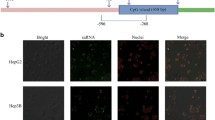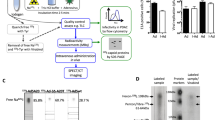Abstract
Purpose
This study aimed to develop a gene expression targeting method for specific imaging and therapy of alpha-fetoprotein (AFP)-producing hepatocellular carcinoma (HCC) cells, using an adenovirus vector containing the human sodium/iodide symporter (hNIS) gene driven by an AFP enhancer/promoter.
Methods
The recombinant adenovirus vector, AdAFPhNIS (containing the hNIS gene driven by human AFP enhancer/promoter) was prepared. After in vitro infection by the adenovirus, hNIS gene expression in AFP-producing cells and in AFP-nonproducing cells was investigated using 125I uptake assay and semi-quantitative reverse transcription polymerase chain reaction (RT-PCR). The killing effect of 131I on AdAFPhNIS-infected HCC cells was studied using an in vitro clonogenic assay. In addition, tumor-bearing mice were intravenously injected with the adenovirus, and scintigraphic images were obtained.
Results
The expression of hNIS was efficiently demonstrated by 125I uptake assay in AFP-producing cells, but not in AFP-nonproducing cells. AFP-producing HCC-targeted gene expression was confirmed at the mRNA level. Furthermore, in vitro clonogenic assay showed that hNIS gene expression induced by AdAFPhNIS infection in AFP-producing cells caused more sensitivity to 131I than that in AFP-nonproducing cells. Injected intravenously in HuH-7 tumor xenografts mice by adenovirus, the functional hNIS gene expression was confirmed in tumor by in vivo scintigraphic imaging.
Conclusions
An AFP-producing HCC was targeted with an adenovirus vector containing the hNIS gene using the AFP enhancer/promoter in vitro and in vivo. These findings demonstrate that AFP-producing HCC-specific molecular imaging and radionuclide gene therapy are feasible using this recombinant adenovirus vector system.






Similar content being viewed by others
References
Levin B, Amos C. Therapy of unresectable hepatocellular carcinoma. N Engl J Med. 1995;332(19):1294–6.
Welzel TM, Graubard BI, Zeuzem S, El-Serag HB, Davila JA, McGlynn KA. Metabolic syndrome increases the risk of primary liver cancer in the United States: a study in the SEER-Medicare database. Hepatology. 2011;54(2):463–71.
Carr BI. Hepatocellular carcinoma: current management and future trends. Gastroenterology. 2004;127(5 Suppl 1):S218–24.
Rodriguez MM, Ryu SM, Qian C, Geissler M, Grimm C, Prieto J, et al. Immunotherapy of murine hepatocellular carcinoma by alpha-fetoprotein DNA vaccination combined with adenovirus-mediated chemokine and cytokine expression. Hum Gene Ther. 2008;19(7):753–9.
Okimoto T, Yahata H, Itou H, Shinozaki K, Tanji H, Sakaguchi T, et al. Safety and growth suppressive effect of intra-hepatic arterial injection of AdCMV-p53 combined with CDDP to rat liver metastatic tumors. J Exp Clin Cancer Res. 2003;22(3):399–406.
Bilbao R, Gerolami R, Bralet MP, Qian C, Tran PL, Tennant B, et al. Transduction efficacy, antitumoral effect, and toxicity of adenovirus-mediated herpes simplex virus thymidine kinase/ ganciclovir therapy of hepatocellular carcinoma: the woodchuck animal model. Cancer Gene Ther. 2000;7(5):657–62.
Havlik R, Jiao LR, Nicholls J, Jensen SL, Habib NA. Gene therapy for liver metastases. Semin Oncol. 2002;29(2):202–8.
Edelstein ML, Abedi MR, Wixon J. Gene therapy clinical trials worldwide to 2007—an update. J Gene Med. 2007;9(10):833–42.
Tangkijvanich P, Anukulkarnkusol N, Suwangool P, Lertmaharit S, Hanvivatvong O, Kullavanijaya P, et al. Clinical characteristics and prognosis of hepatocellular carcinoma: analysis based on serum alpha-fetoprotein levels. J Clin Gastroenterol. 2000;31(4):302–8.
Sa Cunha A, Bonte E, Dubois S, Chretien Y, Eraiser T, Degott C, et al. Inhibition of rat hepatocellular carcinoma tumor growth after multiple infusions of recombinant Ad.AFPtk followed by ganciclovir treatment. J Hepatol. 2002;37(2):222–30.
Miao J, Chen GG, Chun SY, Yun JP, Chak EC, Ho RL, et al. Adenovirus-mediated tBid overexpression results in therapeutic effects on p53-resistant hepatocellular carcinoma. Int J Cancer. 2006;119(8):1985–93.
Willhauck MJ, Sharif Samani BR, Klutz K, Cengic N, Wolf I, Mohr L, et al. Alpha-fetoprotein promoter-targeted sodium iodide symporter gene therapy of hepatocellular carcinoma. Gene Ther. 2008;15(3):214–23.
Dohan O, De la Vieja A, Paroder V, Riedel C, Artani M, Reed M, et al. The sodium/iodide Symporter (NIS): characterization, regulation, and medical significance. Endocr Rev. 2003;24(1):48–77.
Chung JK, Youn HW, Kang JH, Lee HY, Kang KW. Sodium iodide symporter and the radioiodine treatment of thyroid carcinoma. Nucl Med Mol Imaging. 2010;44:4–14.
Dingli D, Russell SJ, Morris 3rd JC. In vivo imaging and tumor therapy with the sodium iodide symporter. J Cell Biochem. 2003;90(6):1079–86.
Mandell RB, Mandell LZ, Link Jr CJ. Radioisotope concentrator gene therapy using the sodium/iodide symporter gene. Cancer Res. 1999;59(3):661–8.
Spitzweg C, Dietz AB, O’Connor MK, Bergert ER, Tindall DJ, Young CY, et al. In vivo sodium iodide symporter gene therapy of prostate cancer. Gene Ther. 2001;8(20):1524–31.
Dwyer RM, Bergert ER, O’Connor MK, Gendler SJ, Morris JC. Sodium iodide symporter-mediated radioiodide imaging and therapy of ovarian tumor xenografts in mice. Gene Ther. 2006;13(1):60–6.
Jin YN, Chung HK, Kang JH, Lee YJ, Kimm KI, Kim YJ, et al. Radioiodine gene therapy of hepatocellular carcinoma targeted human alpha fetoprotein. Cancer Biother Radiopharm. 2008;23(5):551–60.
Kim KI, Kang JH, Chung JK, Lee YJ, Jeong JM, Lee DS, et al. Doxorubicin enhances the expression of transgene under control of the CMV promoter in anaplastic thyroid carcinoma cells. J Nucl Med. 2007;48(9):1553–61.
Lee YJ, Chung JK, Shin JH, Kang JH, Jeong JM, Lee DS, et al. In vitro and in vivo properties of a human anaplastic thyroid carcinoma cell line transfected with the sodium iodide symporter gene. Thyroid. 2004;14(11):889–95.
Spitzweg C, O’Connor MK, Bergert ER, Tindall DJ, Young CY, Morris JC. Treatment of prostate cancer by radioiodine therapy after tissue-specific expression of the sodium iodide symporter. Cancer Res. 2000;60(22):6526–30.
Chung JK. Sodium iodide symporter: its role in nuclear medicine. J Nucl Med. 2002;43(9):1188–200.
Li HJ, Everts M, Yamamoto M, Curiel DT, Herschman HR. Combined transductional untargeting/retargeting and transcriptional restriction enhances adenovirus gene targeting and therapy for hepatic colorectal cancer tumors. Cancer Res. 2009;69(2):554–64.
Sia KC, Huynh H, Chinnasamy N, Hui KM, Lam PY. Suicidal gene therapy in the effective control of primary human hepatocellular carcinoma as monitored by noninvasive bioimaging. Gene Ther. 2012;19(5):532–42.
Smanik PA, Liu Q, Furminger TL, Ryu K, Xing S, Mazzaferri EL, et al. Cloning of the human sodium lodide symporter. Biochem Biophys Res Commun. 1996;226(2):339–45.
Dadachova E, Bouzahzah B, Zuckier LS, Pestell RG. Rhenium-188 as an alternative to Iodine-131 for treatment of breast tumors expressing the sodium/iodide symporter (NIS). Nucl Med Biol. 2002;29(1):13–8.
Dwyer RM, Bergert ER, O’Connor MK, Gendler SJ, Morris JC. Adenovirus-mediated and targeted expression of the sodium-iodide symporter permits in vivo radioiodide imaging and therapy of pancreatic tumors. Hum Gene Ther. 2006;17(6):661–8.
Jeon YH, Choi Y, Lee JT, Kim CW, Chung JK. CpG oligodeoxynucleotides enhance the activities of CD8+ cytotoxic T-lymphocytes generated by combined hMUC1 vaccination and hNIS radioiodine gene therapy. Nucl Med Mol Imaging. 2010;44:199–206.
Chen L, Altmann A, Mier W, Eskerski H, Leotta K, Guo L, et al. Radioiodine therapy of hepatoma using targeted transfer of the human sodium/iodide symporter gene. J Nucl Med. 2006;47(5):854–62.
Klutz K, Willhauck MJ, Wunderlich N, Zach C, Anton M, Senekowitsch-Schmidtke R, et al. Sodium iodide symporter (NIS)-mediated radionuclide ((131)I, (188)Re) therapy of liver cancer after transcriptionally targeted intratumoral in vivo NIS gene delivery. Hum Gene Ther. 2011;22(11):1403–12.
Hsieh YJ, Chen FD, Ke CC, Wang HE, Huang CJ, Hou MF et al. The EIIAPA chimeric promoter for tumor specific gene therapy of hepatoma. Mol Imaging Biol. doi:10.1007/s11307-011-0509-z.
Huyn ST, Burton JB, Sato M, Carey M, Gambhir SS, Wu L. A potent, imaging adenoviral vector driven by the cancer-selective mucin-1 promoter that targets breast cancer metastasis. Clin Cancer Res. 2009;15(9):3126–34.
Huard J, Lochmuller H, Acsadi G, Jani A, Massie B, Karpati G. The route of administration is a major determinant of the transduction efficiency of rat tissues by adenoviral recombinants. Gene Ther. 1995;2(2):107–15.
Faivre J, Clerc J, Gerolami R, Herve J, Longuet M, Liu B, et al. Long-term radioiodine retention and regression of liver cancer after sodium iodide symporter gene transfer in wistar rats. Cancer Res. 2004;64(21):8045–51.
Scholz IV, Cengic N, Baker CH, Harrington KJ, Maletz K, Bergert ER, et al. Radioiodine therapy of colon cancer following tissue-specific sodium iodide symporter gene transfer. Gene Ther. 2005;12(3):272–80.
Acknowledgements
This work was supported by the National Research Foundation of Korea (NRF) grant (grant no. 2012-013480) and the Basic Research Program of the KOSEF (grant no. R01-2006-000-10249-0) funded by the Korean government (MEST).
Conflicts of interest
None.
Author information
Authors and Affiliations
Corresponding authors
Rights and permissions
About this article
Cite this article
Kim, K.I., Lee, Y.J., Lee, T.S. et al. In Vitro Radionuclide Therapy and In Vivo Scintigraphic Imaging of Alpha-Fetoprotein-Producing Hepatocellular Carcinoma by Targeted Sodium Iodide Symporter Gene Expression. Nucl Med Mol Imaging 47, 1–8 (2013). https://doi.org/10.1007/s13139-012-0166-4
Received:
Revised:
Accepted:
Published:
Issue Date:
DOI: https://doi.org/10.1007/s13139-012-0166-4




